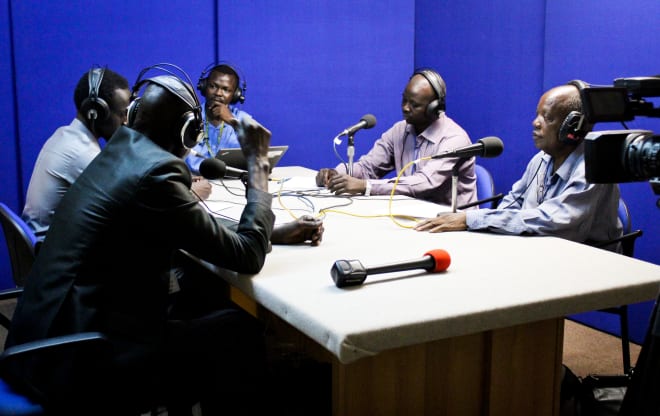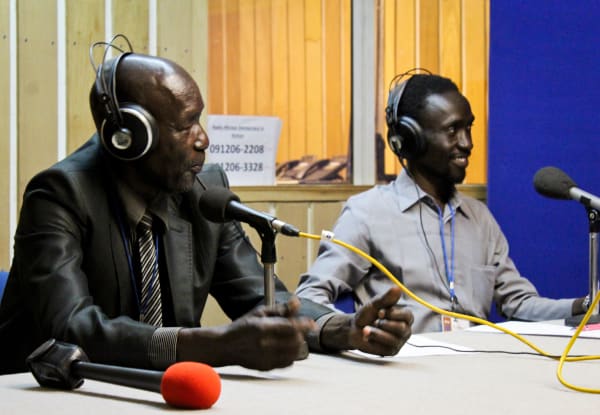Dispatches from the IGAD Regional Initiative: Performing Surgical Procedures in Challenging Contexts in South Sudan
Since 2013, Dr. Buwembo Kakande, a general surgeon from Uganda with over a decade of experience in the operating room, has mentored and trained two South Sudanese physicians, Mabor Matuiery and Nixon Anthony. Their training has covered several surgical procedures ranging from amputations to appendectomies. The surgical team works at one of the largest medical facilities in South Sudan, the Wau Teaching Hospital, located in the country's northwest.
Dr. Kakande explained during an interview with Lukan David, Radio Miraya's host, that his colleagues' skills were initially elementary, and their surgical experience was minimal.
"But at this point," a proud Dr. Kakande declared, "I'm their surgical assistant."

Interview at Radio Miraya in Juba, South Sudan's capital, about the impact of the IGAD Initiative. Dr. Kakande (bottom right) listens to one of his "twins" talk about the progress they've made. Photo: Elena Sosa Lerín/UNDP
During the interview, Dr. Kakande shared his first impressions upon arrival at the hospital. He thought surgeries were impossible due to the facilities' deteriorating conditions and the frequent lack of medical supplies.
But he found motivation in his colleagues' eagerness and willingness to learn as much as possible, given the difficult circumstances.
"I love surgeries. I want to learn everything," said Mr. Anthony. "I'm grateful Dr. Kakande is here. He has taught us so much."
Both Mr. Matuiery and Mr. Anthony, who is the acting medical director of the Wau Teaching Hospital, can benefit from Dr. Kakande's expertise thanks to the support of the governments of Ethiopia, Kenya, and Uganda through a capacity development initiative from the Intergovernmental Authority on Development (IGAD), an eight-country trade block in eastern Africa.
The objective of the IGAD Initiative is to strengthen the capacity of the South Sudanese civil service at a national and provincial level. Seasoned civil servants from these three East African countries — known as civil service support officers (CSSOs) — are seconded to South Sudan and paired with a South Sudanese counterpart, usually referred to as a "twin."
The relationship is one of mentoring, coaching and close collaboration.
Since 2011, more than a hundred CSSOs, working mostly on two-year contracts, have come to South Sudan to support capacity efforts in different sectors like agriculture, aviation, finance, and public health. Their salaries are covered by their own countries while other expenses are paid by Norway's government, the project's only donor. The United Nations Development Programme (UNDP) is responsible for the coordination and implementation of this initiative.
Working conditions in South Sudan are challenging. As the three physicians explained throughout the interview, they are keenly aware that people in great need and even greater pain desperately need them.
When asked about the most significant hurdles they face in their work, Mr. Matuiery, of a quiet and gentle demeanour, emphasized that "We work on empty stomachs." After two-and-a-half years of civil war, the South Sudanese economy is in a dire state. Three months have passed since the country's civil servants were last paid.
"Our people need us. If we aren't there for them, they die," said Mr. Anthony. "But we have family responsibilities too, and we sometimes can't fulfil them because of money. But we have to work, or people lose their loved ones."
"We have to improvise a lot because we have very basic conditions," said Dr. Kakande. "We've been able to do many complex surgeries with very basic facilities."
Alexander Paulino's case serves as an example of their efforts. Speaking enthusiastically in Arabic during the interview, he explained how he was about to lose his life due to severe gangrene in his right leg.
The surgeons saved his life by amputating it. There was no other option. Paulino also talked about how they assisted him in his physical rehabilitation, which helped him get back on track and continue his life.

Former patient, Alexander Paulino (left) and "twin" Mabor Matuiery share their experiences about navigating South Sudan’s challenging public health sector. Photo: Elena Sosa Lerín/UNDP
The three doctors agree that there's talent and skill and eagerness in South Sudan when studying and practicing medicine.
However, if not the downright absence of essential medical supplies and equipment, the critical shortage constrains their work, which means existing health conditions worsen by the day. In other words, as Dr. Kakande put it, "we are either condemning someone to die, or to have an unpleasant life."
The three surgeons know that they could save a lot of lives with the right equipment and the right drugs.
"All we can do is work with what we've got," explained Dr. Anthony. "And we've done plenty."
"I'm very happy with my twins," says Dr. Kakande. "They can do all sorts of procedures, and they're good at it. They can stand on their own, even when I'm not there. That's what matters."
► A version of this story was originally published on May 2016 in the website of the United Nations Development Programme (UNDP) in South Sudan.
Follow me on Twitter: @e_sarin. Email me your thoughts, suggestions, or critiques at: elenasosalerin@gmail.com.